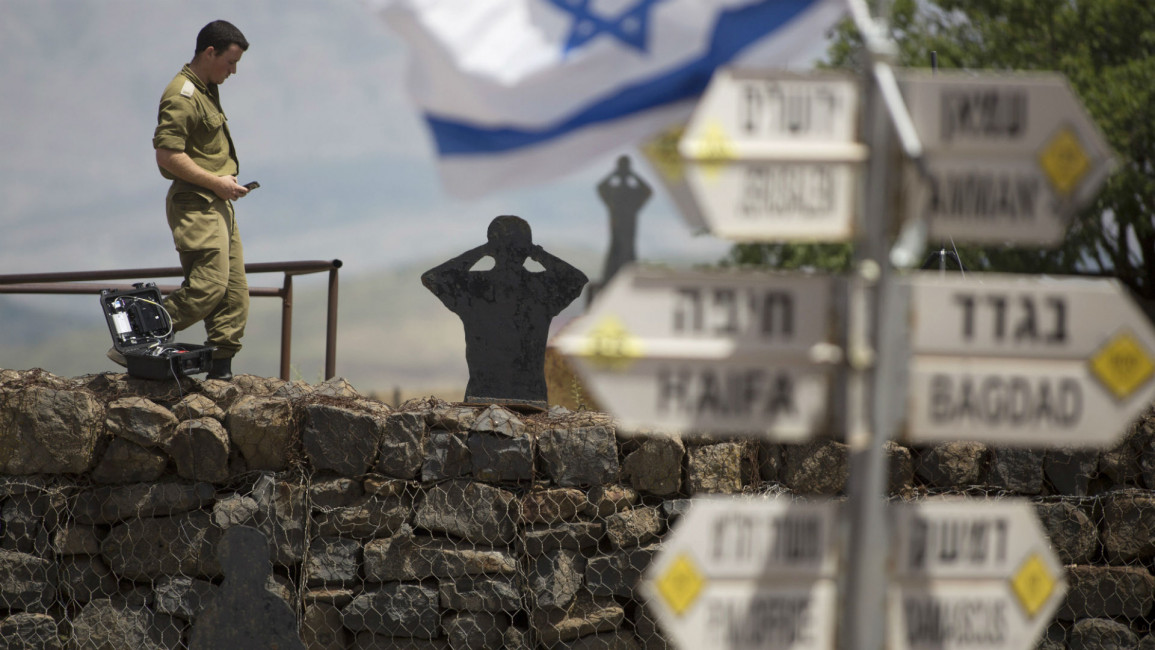World leaders respond to Israeli-Iranian tensions in Syria
In the early hours of the morning, explosions were heard in Damascus, while live images were broadcast on television showing projectiles above the Syrian capital and several missiles destroyed by Syrian anti-aircraft systems.
Syrian state media claimed that Israeli missile struck first, launching air raids in Syria that hit military bases, in addition to an arms depot and a military radar installation, without specifying the locations.
Around 20 rockets were then fired from Syria in response, targeting Israeli forces in the occupied Golan Heights at around midnight.
Israel blamed the rocket fire on Iran's al-Quds Force, adding that Tel Aviv's anti-missile system intercepted four of the projectiles while the rest did not land in territory it controls.
Syria's foreign ministry said that the salvo of Israeli strikes on its territory marked a "new phase" of direct involvement in the country's seven-year conflict.
In a statement carried by its state news agency SANA, it said Israel's "direct confrontation... signals the start of a new phase of the war on Syria".
Israel's "aggressive behaviour… will not lead to anything but an increase in tension in the region", the ministry said.
It was "a serious threat to international peace and security", the ministry added.
The Syrian Observatory for Human Rights, a UK-based monitor, said the strikes near Damascus, as well as in the central and southwestern regions of the country, killing 23 regime fighters.
The Syrian army said three people had been killed.
World response
Bahrain - who supported Trump's decision - has expressed support for Israel's strikes in a rare and possibly unprecedented, public stance by an Arab government.
France has urged restraint, with French President Emmanuel Macron calling for a "de-escalation" in Syria.
Paris called on Iran to refrain from "any military provocation" in Syria, warning Tehran "against any temptation for regional dominance".
But the foreign ministry also reiterated France's "unwavering support for Israel's security and condemns all attempts to harm it".
The UK condemned "in the strongest terms" the rockets fired on Israel, adding that "we strongly support Israel's right to defend itself".
"It is crucial to avoid any further escalations, which would be in no one's interest," Foreign Secretary Boris Johnson said in a statement.
He called for the Iranian regime to "refrain from further actions which will only lead to increased instability in the region.
"We also continue to call on Russia to use its influence to press those in Syria to cease their destabilising activity and work towards a broader political settlement," he added.
Germany proportioned blame on Iran, and accused it of "provocation" after it fired a battery of rockets and missiles at Israeli army positions in the occupied Golan Heights.
"These attacks are a serious provocation that we strongly condemn. As we have always emphasised, Israel has a right to self-defence," said a German foreign ministry spokeswoman said in a statement.
She added that it is "crucial that there is no further escalation".
The US, which backs Israel, condemned Iran and said Israel had the right to self-defence, laying the blame squarely on Iran.
"We strongly support Israel's right to act in self-defence," said a White House statement.
It noted that "all nations to make clear that the Iranian regime's action pose a severe threat to international peace and stability".
"The Iranian regime's deployment into Syria of offensive rocket and missile systems aimed at Israel is an unacceptable and highly dangerous development for the entire Middle East.
|
|
"Iran's Islamic Revolutionary Guard Corps (IRGC) bears full responsibility for the consequences of its reckless actions, and we call on the IRGC and its militant proxies, including Hizballah, to take no further provocative steps," it said.
Mediation
Russia, which like Iran is a steadfast ally of Assad, also urged "restraint on all sides", with its Foreign Minister Sergei Lavrov saying the dispute could be "solved through dialogue".
Analysts say Moscow could be uniquely positioned to tamp down tensions between Israel and Iran because of its ties to both.
"This is not a sustainable situation," said Heiko Wimmen of the International Crisis Group.
"You need some mediation, and the best player to do that is Russia."
Iran, which has been a staunch ally of Syria's Bashar al-Assad since the conflict began, has strongly condemned Israeli aggression on Syrian land.
The Iranian Revolutionary Guard Corps' deputy said recent escalations in the region are mere attempts to force Iran to "surrender".
"Our enemies will not dare to choose the military option but they will choose economic sanctions," Salami said on Thursday.
He also said that European efforts to revive the process were doomed to fail.
"The important thing is to revive the resistance amid this economic war."
He also slammed Europe's inability to free itself from "obedience and dependency of America".
said recent escalations in the region are mere attempts to force Iran to 'surrender'.
Saudi Arabia is yet to comment on the escalations, the kingdom praised Donald Trump’s move to pull out of the historic nuclear deal with Iran just a day earlier.
Along with Israel, the regional rival of Iran and longtime US ally, said it "supports and welcomes" Trump's decision.
"The kingdom supports and welcomes the steps announced by the US president towards withdrawing from the nuclear deal... and reinstating economic sanctions against Iran," the foreign ministry said.
The UAE and Bahrain also issued statements via their foreign ministries in support of Trump's decision.




